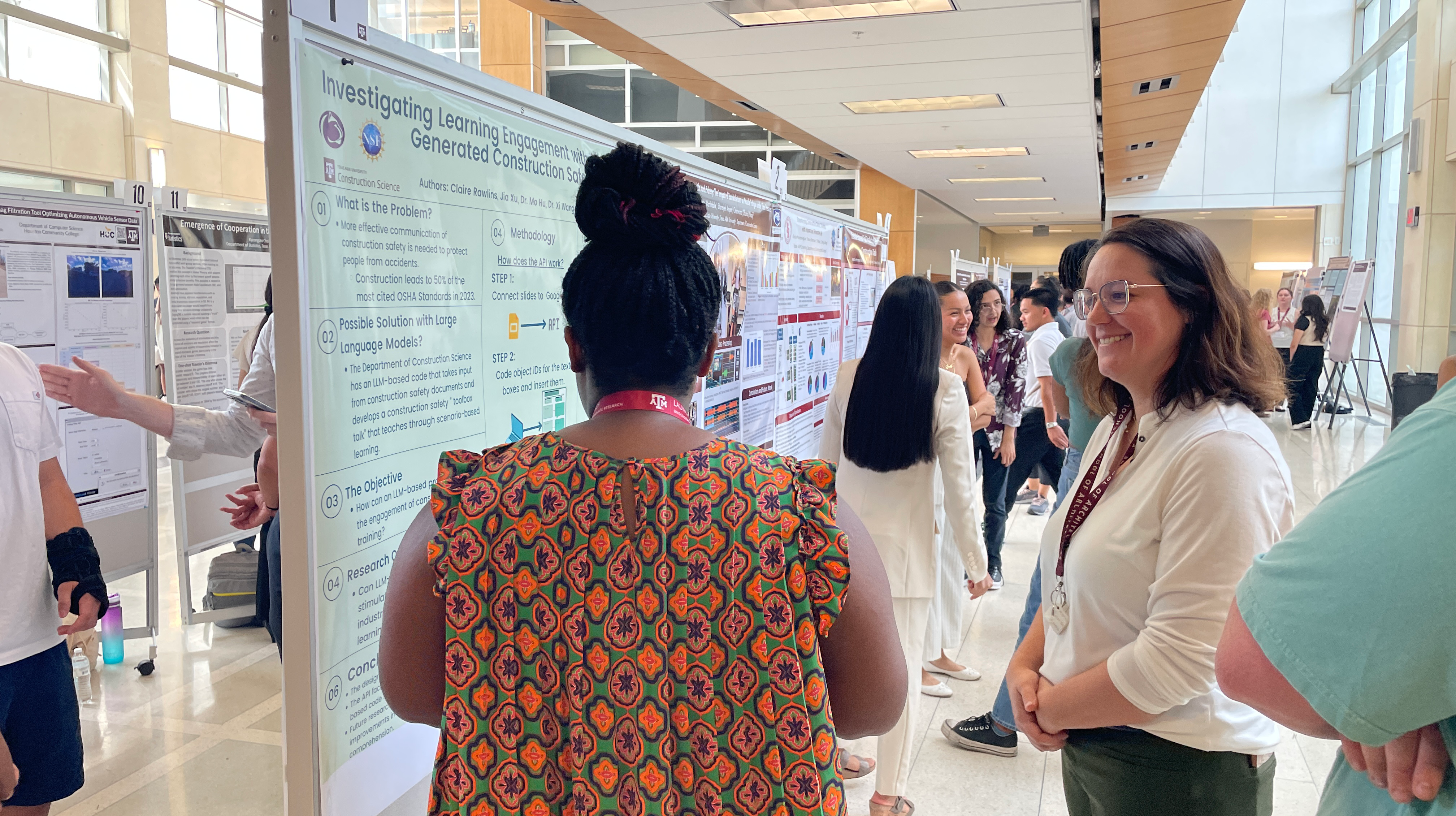Research Opportunities
The ultimate goal of this program is to provide a high-quality, rewarding and enjoying summer research experience for undergraduate students interested in construction (and related fields).
Our program will consist of individual and group activities, reinforced with enrichment and professional development activities, as well as a continuous mentorship and tracking plan.
Students will work with their faculty mentors on a scaled research project designed to allow students to experience the entire research experience, including:
- Research problem identification
- Literature review
- Data collection and/or experiment
- Data analysis and/or model development
- Validation of the results/model
- Interpretation of the results
- Presentation
- Possible publication of the research
This holistic process and experience will allow REU students to build a sense of ownership of their project and obtain strong confidence in conducting research as an independent researcher at the end of the REU program. During the process, both faculty mentors and graduate student mentors will constantly monitor the student’s research progress and provide proper guidance to ensure that each student will build critical thinking skills and obtain effective research skills and techniques to conduct science driven research, and produce evidence informed research results.
Other Enrichment and Professional Development Activities
Every Wednesday will be used to provide enrichment activities and professional development activities. Enrichment activities include invited presentations from industry innovators and a faculty seminar series. Enrichment activities will also include a field trip to innovation-driven companies in Texas. These activities will give REU students opportunities to witness how construction research is being applied in real settings and helping innovate the industry.
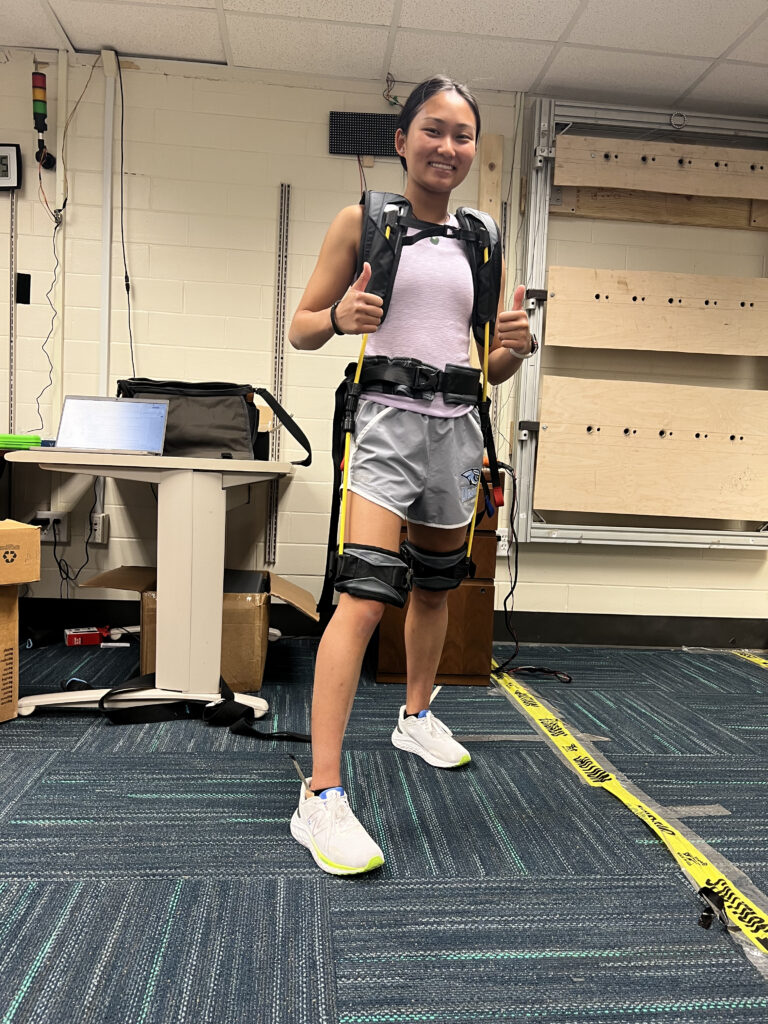
REU students will participate in a REU orientation program and a welcome BBQ organized by the LAUNCH office (launch.tamu.edu) in the first week. College Station and the surrounding area have plenty of recreational activities. Optional weekend activities will also be organized by mentors to aid with socializing and building relationships between peers and mentors. A farewell dinner in Week 10 that will be arranged by the Department of Construction Science will offer another opportunity for the REU students to celebrate their accomplishments and build long-term relationships between the participant students, faculty and graduate student mentors.
The Research Environment
As a major research-intensive university, Texas A&M is at the forefront in making significant contributions to scholarship and discovery, including in science and technology. Research conducted at Texas A&M generated annual expenditures of more than $1.15 billion in fiscal year 2022, which is first in Texas. Texas A&M also ranked in the top 16 universities of the most recent NSF Higher Education Research and Development survey based on research expenditures in fiscal year 2021.
The Department of Construction Science at Texas A&M is the largest construction program in the nation and it offers B.S., M.S., and Ph.D. degrees in construction science. Our faculty are internationally recognized for their excellence and impact.
The research topics are provided below with collapsible accordions as well as in a document form by selecting the following button.
Work with talented researchers on projects including:
Research Topic 1: Virtual Reality-Based Serious Simulation Games for Construction
Research Description
 In this research, you will have the opportunity to develop serious games and simulations to revolutionize the learning process of soft and abstract concepts and principles that are common in the field of project management and construction management. Through engagement in a serious game, participants can develop an understanding of challenging abstract concepts—often delivered via “A-ha” moments. A simulation will allow participants to test and measure the impact of a single variable by comparison against a control so they can develop an accurate and deep understanding of the topic being explored. An interactive simulation in a group setting can allow participants to communicate and collaborate using critical thinking skills to generate preferred solutions to a given problem, mimicking decision-making processes in industry. This research project develops and tests virtual reality (VR) simulation games to assess the efficacy of a VR learning mode compared to traditional learning modes to identify effective features that should be considered for future simulation game development.REU Research Plan: REU students will be involved in developing a new simulation game during the summer months with graduate student mentors and faculty advisors. The students will conduct a literature review to summarize existing knowledge about serious games and simulations. The students will be given extensive tutoring and guidance on computer coding skills by graduate student mentors; they will also be given a series of coding assignments to develop parts of the game. The students will test existing prototype games with undergraduate students and measure the outcomes using statistical methods based on pre- and post-survey data. The students will be given an opportunity to write a conference/journal paper with the research team members.
In this research, you will have the opportunity to develop serious games and simulations to revolutionize the learning process of soft and abstract concepts and principles that are common in the field of project management and construction management. Through engagement in a serious game, participants can develop an understanding of challenging abstract concepts—often delivered via “A-ha” moments. A simulation will allow participants to test and measure the impact of a single variable by comparison against a control so they can develop an accurate and deep understanding of the topic being explored. An interactive simulation in a group setting can allow participants to communicate and collaborate using critical thinking skills to generate preferred solutions to a given problem, mimicking decision-making processes in industry. This research project develops and tests virtual reality (VR) simulation games to assess the efficacy of a VR learning mode compared to traditional learning modes to identify effective features that should be considered for future simulation game development.REU Research Plan: REU students will be involved in developing a new simulation game during the summer months with graduate student mentors and faculty advisors. The students will conduct a literature review to summarize existing knowledge about serious games and simulations. The students will be given extensive tutoring and guidance on computer coding skills by graduate student mentors; they will also be given a series of coding assignments to develop parts of the game. The students will test existing prototype games with undergraduate students and measure the outcomes using statistical methods based on pre- and post-survey data. The students will be given an opportunity to write a conference/journal paper with the research team members.
Keywords: serious game, simulation, computer science, computer programming, civil engineering, construction management, building construction.
Required Skills: coding skills and basic knowledge of statistics.
Undergraduate Degrees: Computer Science, Civil Engineering, Building Construction, Construction Science/Management.
Faculty Advisors: Dr. Zofia Rybkowski, and Dr. David Jeong
Research Topic 2: AI-driven Immersive Platform for Enhancing Cultural Competency in Construction Education
Research Description
In this research, you will have the opportunity to help develop an AI-driven immersive platform to enhance cultural competency in Construction Education. Given the significant role of Hispanics and minorities in the construction workforce, it is crucial to train future construction managers in cultural awareness. The project aims to develop an immersive environment to reinforce these skills. The study involves identifying key cultural competencies and developing an immersive AI-driven environment to provide personalized feedback; in so doing, users can enhance their cultural competency skills and manage a diverse workforce effectively.
REU Research Plan:
REU students will begin with a literature review, then, under the guidance of graduate mentors and faculty advisors, help develop AI-supported immersive construction scenarios and evaluate the feasibility and effectiveness of the platform. Finally, students will present their findings at conferences and contribute to journal publications.
Keywords: Immersive Platform; Cultural Competency; Construction Education; Diversity; Artificial Intelligence
Required Skills: Basic knowledge in statistics analysis and at least one coding language.
Undergraduate Degrees: Civil Engineering, Construction Science/Management, Industrial Engineering, Computer Science.
Faculty Advisors: Dr. Minerva Bonilla, Dr. Chukwuma Nnaji, and Dr. Ashrant Aryal
Research Topic 3: Optimizing Construction Performance and Safety of Innovative Intersections and Interchanges
Research Description
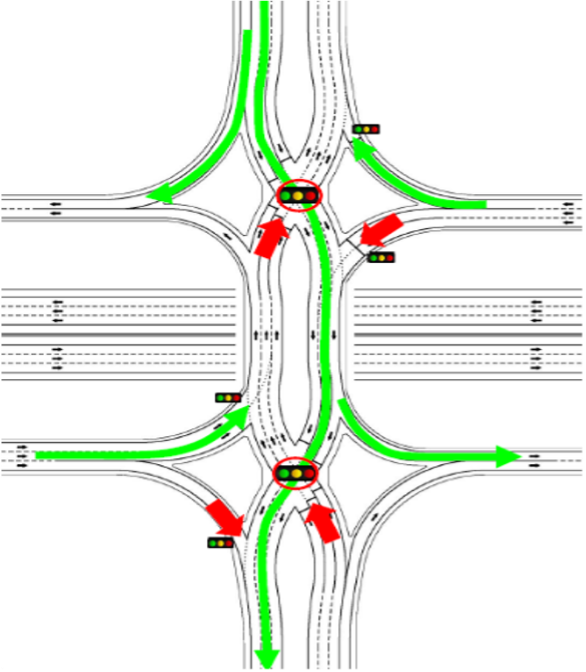
This research project aims to enhance the performance and safety of innovative intersections and interchange (e.g., Diverging Diamond Interchange). These designs are crucial for promoting sustainability in transportation infrastructure, as they enhance traffic flow, increase capacity and safety, and account for future traffic demands. This study will identify common challenges affecting project outcomes and develop predictive tools to improve project performance. Additionally, it will also evaluate safety measures for the construction of these Innovative Intersections and Interchanges.
REU Research Plan:
REU students will work with graduate mentors and a faculty advisor. Their involvement will include:
-
- Conduct a literature review
-
- Assist in analyzing data
-
- Support the development of predictive models
-
- Contribute to the writing of a conference or journal paper to disseminate the project findings
Keywords: Project Performance; Risk Management; Work Zone Safety; Innovative Intersections and Interchanges
Required Skills:
-
- Data analysis and understanding of statistical methods
-
- Coding skills
-
- Technical writing and research documentation skills (Ideal)
-
- Strong communication skills
Undergraduate Degrees: Civil Engineering (Transportation Focus), Construction Science/Management, Industrial Engineering
Faculty Advisor: Dr. Minerva Bonilla
Research Topic 4: Semantic Data Interoperability Technologies across the Life Cycle of Process Plant Projects
Research Description
Poor data interoperability is a major issue in the process industry, hindering seamless data exchange and integration across project life cycles. Seamless data exchange is essential for effective communication and collaboration among stakeholders, with failure leading to delays, cost overruns, and data inconsistencies. The core of the data interoperability problem lies in the diverse proprietary systems used by multiple stakeholders to process and exchange data that often lack standardized definitions and formats. To address this challenge, this research aims to develop semantic data interoperability technologies utilizing multi-modal language models. By enabling the seamless exchange and integration of diverse datasets from multiple, our goal is to improve data quality and increase the efficiency of work processes.
REU Research Plan:
REU students will be involved in developing data interoperability models for several key equipment and instruments included in process plants under the guidance of a postdoctoral researcher. This research involves three tasks: (1) identifying the terms to define the specifications of equipment and instruments from catalogs, manuals, and other resources; (2) matching disparate terms to define identical objects from various software; (3) leveraging multi-modal language models to transform data into a format that is compatible with various software templates.
Keywords: Data Interoperability, Data Exchange and Integration, Data Template, Multi-modal Language Model
Required Skills: Familiar with Large-Language Models
Undergraduate Degrees: Construction Management, Computer Science, Mechanical Engineering, Chemical Engineering
Faculty Advisor: Dr. David Jeong
Research Topic 5: Building Envelopes for Enhanced Energy Efficiency and Resilience Against Heat-Related Extreme Events
Research Description
Buildings are major consumers of energy, particularly for heating and cooling. The building envelope, which includes the external walls, roof, and windows, is crucial for determining how much energy a building consumes. This envelope is also vital for maintaining a comfortable indoor climate during extreme weather conditions like heatwaves or cold snaps, especially when power outages occur. The term “passive survivability” refers to a building’s ability to keep conditions livable without relying on active heating or cooling systems. As extreme weather events become more frequent, there is a growing need to explore solutions that can sustain comfortable indoor conditions even during power outages. This research project aims to investigate how different materials used in building envelopes impact both energy consumption during regular operations and passive survivability during extreme conditions.
REU Research Plan:
Research Experience for Undergraduates (REU) students will engage in a comprehensive research agenda that involves utilizing energy models to scrutinize how buildings consume electricity. Additionally, they will investigate the varying thermal comfort preferences among individuals in indoor environments. The primary responsibilities will include the integration of thermal comfort models into energy simulation frameworks. These augmented models will then be adapted to assess how different building envelope materials influence passive survivability. The ultimate goal is to acquire a nuanced understanding of how diverse building materials and envelope technologies affect both routine energy consumption during normal operations and passive survivability during extreme events. Students will also have the opportunity to contribute to a conference or journal article alongside the research team.
Keywords: Building Envelopes, Energy Efficiency, Passive Survivability, Thermal Comfort, Extreme Events.
Required Skills: Programming experience and a basic understanding of statistical analysis. Some familiarity with building energy modeling software is a plus.
Undergraduate Degrees: Civil Engineering, Mechanical Engineering, Computer Science, Construction.
Faculty Advisor: Dr. Ashrant Aryal
Research Topic 6: Assessment of Freeze-Thaw Performance of 3D-Printed Concrete
Research Description
The objective of this study is to establish and test a standardized method for evaluating the freeze-thaw performance of 3D-printed concrete used in building construction. The devised methodology will aim to more accurately reflect the exposure conditions typically encountered in vertical building applications. It is essential to consider how factors such as printing techniques, geometry, and surface coatings can influence the performance of the finished product. This attention to detail is crucial to ensure that a material design that could otherwise be satisfactory is not overlooked and that a well-designed material is not improperly disqualified due to poor printing quality. The proposed parametric and optimization study will address sample preparation, specimen size and geometry, exposure regimen conditions, testing procedures and equipment requirements, and acceptance performance criteria.
REU Research Plan:
Research Experience for Undergraduates (REU) students will participate in a comprehensive research agenda that involves experimental testing and data analysis in a laboratory setting. The primary responsibilities will include learning and implementing both destructive and non-destructive testing methods commonly used to evaluate the properties of concrete materials. Students will fabricate specimens by mixing concrete and 3D-printing materials. They will also develop and execute an experimental plan to assess the performance of 3D-printed concrete. Basic statistical methods will be utilized to analyze the collected data sets. Additionally, students will have the opportunity to present their findings and contribute to a conference or journal article alongside the research team.
Keywords: Concrete, Durability, 3D-printing, material science
Required Skills: Basic understanding of statistical analysis. Familiarity with concrete and/or construction material, familiarity with 3D-printing and laboratory work is a plus.
Undergraduate Degrees: Civil, Material, Mechanical Engineering, Construction and Architecture.
Faculty Advisor: Dr. Julie Ann Hartell
Research Topic 7: Socio-technical Challenges to equitable wastewater services in rural, underserved Communities
Research Description
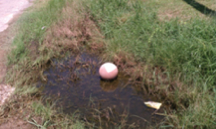
The Black Belt region of rural Alabama has long struggled from a lack of access to managed wastewater infrastructure, resulting in the presence of raw sewage on the ground and significant risks to public and environmental health. Due to high poverty in these underserved communities, many residents use straight pipe discharge to backyards or streams, as advanced onsite wastewater systems are not affordable. Such unacceptable sanitation conditions have drawn extensive local, national, and international attention, calling for technological and regulatory solutions to address wastewater issues in these communities. Research efforts at Bakchan Lab are ongoing to provide explicit characterization of this wastewater crisis in the Black Belt, by documenting challenges spanning the various dimensions of the operating environment (e.g., social, financial, regulatory, institutional). This research project would enable decision-makers to proactively make policy and funding changes to potentially address inadequate wastewater management in rural, underserved communities, bringing awareness to pressing environmental justice concerns.
REU Research Plan:
REU students will be involved in conducting and analyzing semi-structured interviews with stakeholders in Alabama (e.g., regulators, utilities, residents) during the summer months. Under the supervision of graduate mentors and Dr. Bakchan, the students will conduct literature review to summarize existing research studies surrounding the wastewater issues in the Black Belt and identify knowledge gaps to further support the contributions of this research project. Additionally, the REU students will assist in (1) conducting qualitative coding of the interviews, (2) assessing the reliability of coding using intercoder reliability test, and (3) write a conference/journal paper, upon mutual interest.
Keywords: Decentralized wastewater management; socio-technical challenges; rural underserved communities; environmental justice; infrastructure equity; semi-structured interviews; qualitative analysis.
Undergraduate Degrees: Civil Engineering, Construction Science/Management.
Faculty Advisor: Dr. Amal Bakchan
Research Topic 8: Metaverse as a Novel Educational Tool in the Field of Construction
Research Description
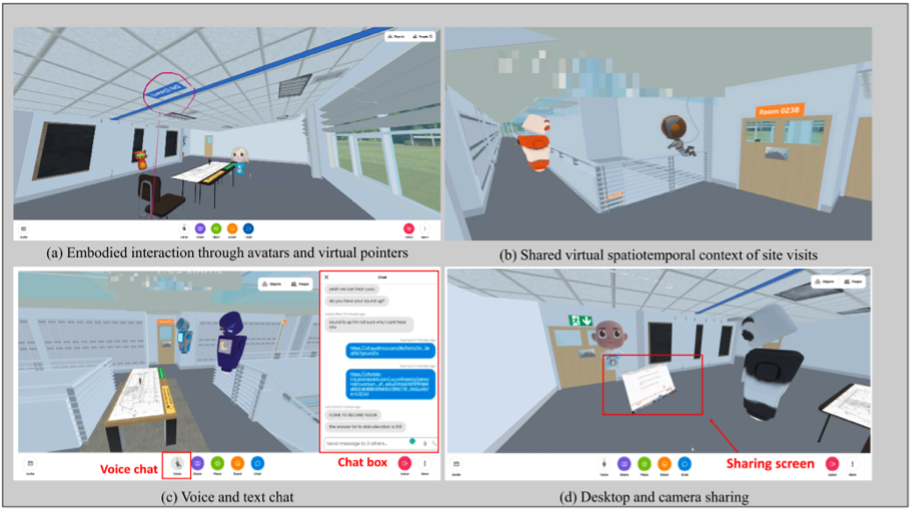
This research aims to investigate the use of the metaverse as a novel educational tool in the field of construction. Specifically, it focuses on replicating and enhancing the educational benefits of traditional construction site visits by creating a collaborative virtual environment within the metaverse. This virtual environment will enable students to engage in immersive, interactive, and educational construction site experiences, overcoming geographical boundaries and logistical constraints. By harnessing the metaverse’s capabilities, this research seeks to provide a transformative learning experience for students in construction-related disciplines, offering them a unique opportunity to explore and understand construction concepts in a virtual yet realistic setting.
REU Research Plan:
During the REU program, students will actively participate in the development and evaluation of this metaverse-based educational tool. They will contribute to the technical development of the virtual environment, assess its feasibility for conducting virtual site visits, and analyze its educational impact on students’ learning outcomes. Through this hands-on experience, students will gain valuable insights into the potential of emerging technologies in education and construction, enhancing their coding skills and applying basic statistics to measure the effectiveness of this innovative approach.
Keywords: Metaverse, virtual construction site visits, immersive learning, construction education.
Required Skills: Coding skills and basic knowledge of statistics.
Undergraduate Degrees: Computer Science, Visualization, Civil Engineering, Architecture, Building Construction, Construction Science/Management.
Faculty Advisor: Dr. Gilles Albeaino
Research Topic 9: Transforming Virtual Learning for Construction Safety Using Large Language Models
Research Description
Online, self-paced safety training has become increasingly common in the construction industry. Yet, as anyone who has taken an online driver’s education course knows, these modules—while incredibly convenient—often lack the interactive dynamics that makes in-person learning effective. Through this research project, we will investigate ways to develop and embed a virtual learning tutor powered by large language models (LLMs) within these digital training modules. The objective is to simulate the expertise and responsiveness of a seasoned instructor, thereby providing a dynamic, personalized learning experience that will ultimately contribute to enhanced safety on construction sites.
REU Research Plan:
During the summer months, REU students will work with graduate student mentors and faculty advisors to develop and evaluate an AI-powered safety tutor that supports interactive learning within virtual environments. The students’ involvement will include the following:
- Review scholarly literature on adult learning principles and engagement strategies;
- Apply these research-based insights to instruction-tune and fine-tune LLMs for optimized learning engagement;
- Assess the tool’s efficacy against its intended objectives; and
- Contribute to the writing of a conference/journal paper to disseminate the project
Keywords: adult learning, safety training, human-computer interaction, artificial intelligence, language models, civil engineering, construction management
Required Skills: basic knowledge of statistics and fundamental programming concepts.
Undergraduate Degrees: Computer Science, Civil Engineering, Building Construction, Construction Science/Management.
Faculty Advisor: Dr. Zhenyu Zhang
Research Topic 10: Teaching Data Sensing Skills and Computational Thinking through Virtual Reality (VR)
Research Description
The construction industry, a major economic sector in the U.S. contributing 4.1% to GDP, faces ongoing challenges like labor shortages, stagnant productivity, and safety concerns. In response, the industry is increasingly adopting data sensing technologies such as robodog, robotic total stations, drones, wearable devices, and GPS to enhance project planning, workforce safety, productivity, sustainability, and quality. These technologies are reshaping construction, driving a need for skilled professionals capable of transforming sensor data into actionable insights. Currently, 61% of U.S. construction firms use these technologies, with 32% planning to adopt them within the next decade. This shift highlights the need to prepare future engineers with the understanding of data sensing technologies and to raise K-12 student awareness of STEM careers involving data sensing and computational thinking. In this research, we aim to teach middle and high school students about data sensing technologies using virtual reality (VR), one of the most effective platforms for learning and training. Through this immersive VR system, we will assess students’ computational thinking skills as they engage with data-sensing concepts. The VR environment will enhance knowledge retention, helping students understand when and how to apply data-sensing technology. Using an interactive, block-based approach, students will learn to construct algorithms to complete specific tasks, promoting decision-making and computational thinking skills essential for future STEM careers.
REU Research Plan:
REU students will undertake a project focused on designing, executing, and analyzing experiments using a VR-based tool to teach data sensing and computational thinking skills. The project will begin with a literature review to explore VR applications in education, particularly in data analysis and computational thinking. Guided by graduate mentors, students will conduct experiments using the developed VR tool, gathering data on participant engagement, knowledge retention, and computational thinking skills. After collecting and analyzing this data, especially regarding computational thinking development, students will make targeted improvements to the VR environment based on their findings. This research will culminate in a conference paper, with the REU student as the lead author, detailing their methodology, findings, and contributions, which will be submitted to an international conference.
Keywords: Virtual Reality, Education, Data Sensing, Immersive Learning, K-12.
Required Skills: Basic understanding of VR, Research Background, Analysis software (SPSS etc.)
Undergraduate Degrees: Computer Science, Civil Engineering, Construction Science/Management, Industrial Engineering.
Faculty Advisors: Dr. Chukwuma Nnaji, Dr. Gilles Albeaino
Research Topic 11: Fatigue Monitoring of Construction Workers Using Advanced Machine Learning
Research Description
Fatigue is a significant issue in the construction industry, leading to reduced productivity, poorer work quality, and an increased risk of accidents. Traditional methods for assessing fatigue, such as surveys and questionnaires, are inconvenient and unsuitable for real-time monitoring on active construction sites. This research project proposes a smart fatigue monitoring system that integrates hardware (Arduino with heart rate, Bluetooth, and vibration sensors) and software (a mobile application) to classify fatigue levels in real-time. The project involves constructing a compact circuit with heart rate, Bluetooth, and vibration sensors. Machine learning models will be trained using previously collected heart rate data (objective) and fatigue ratings (subjective) to classify fatigue levels accurately. These models will be deployed in a mobile application connected to the developed hardware, enabling the app to receive live heart rate data. When the system detects that a worker is fatigued, it will trigger a vibration alert via the hardware to notify the worker, promoting timely interventions. This integrated approach offers a practical and efficient solution for real-time fatigue monitoring, providing a responsive tool to support safety and productivity in construction environments.
REU Research Plan:
REU students will be at the forefront of this innovative project. The research will begin with a thorough literature review on existing fatigue detection methods and their effectiveness in the construction industry. Students will then collaborate with experts in machine learning and sensing technology to design a prototype. They will participate in both the hardware and software development phases to bring the system to completion, followed by experiments to evaluate its effectiveness. The prototype will undergo multiple testing phases, with refinements made based on feedback and results. By the end of the research period, students will have the opportunity to present their findings at conferences and contribute to journal publications.
Keywords: Fatigue prediction, Machine Learning, Sensor Technology, Wearable Sensors, Construction Safety.
Required Skills: Understanding of sensor technologies, Mobile Development, Circuit Development
Undergraduate Degrees: Computer Science, Electrical Engineering, Computer Engineering
Faculty Advisors: Dr. Chukwuma Nnaji, Dr. Ashrant Aryal
Research Topic 12: Advanced sensing technologies for preventing construction workers’ work-related musculoskeletal disorders (WMSDs)
Research Description
Construction tasks frequently necessitate prolonged overexertion without sufficient rest, leading to physical fatigue. This fatigue can contribute to work-related musculoskeletal disorders (WMSDs). Construction workers face a significantly higher risk of WMSDs than those in other industries, with approximately 20% affected by these conditions. Therefore, it is essential to monitor and manage construction tasks to prevent WMSDs.
The advent of wearable sensing technologies—including motion sensors (e.g., inertial measurement units) and physiological sensors (e.g., heart-rate sensors, electrodermal activity sensors, skin-temperature sensors, eye trackers, and brainwave monitors)—has created unprecedented opportunities for near real-time collection and analysis of workers’ safety and health data. This project explores methodsdetecting activities that expose workers to the risk of developing WMSDs by assessing hand movements and gait patterns.
REU research plan:
REU students will be involved in identifying construction tasks that expose workers to the risk of developing WMSDs and conducting experiments using inertial measurement units (IMUs). The students will first perform a job hazard analysis and literature review to understand which construction tasks can be monitored and measured using IMUs. The advisor and graduate student mentor will work with the REU students to design experiments and collect data. The students will receive guidance on coding, data preprocessing, anomaly detection, and classification using machine learning techniques. They will also have the opportunity to contribute to a conference or journal paper with the research team members.
Keywords: Work-related Musculoskeletal Disorders (WMSDs), Wearable Sensing, Construction Safety
Required/Preferred Skills: Basic knowledge of statistics and coding (e.g., MATLAB, Python)
Undergraduate Degrees: Computer Science, Civil Engineering, Building Construction, Construction Science/Management
Faculty Advisor: Dr. Namgyun Kim
Research Topic 13: Making Robots Intelligent Assistants to Construction Workers
Research Description
Robotics presents a promising solution to reduce the workload of construction workers while addressing productivity challenges and labor shortages within the construction industry. Given the complexity and variability of construction environments, effective integration requires that robots coexist and interact with human workers on job sites. This research will explore the transformative field of human-robot interaction, with a specific focus on deploying robots as intelligent assistants to support construction workers. Your work on this project will involve configuring and programming construction robots to assist in various on-site construction tasks. You will also develop communication protocols between robots and human workers, ensuring that robots can accurately interpret workers’ intentions and respond with appropriate assistance. The project envisions an interdisciplinary approach that shifts the role of construction workers from performing physically demanding tasks to supervising robotic systems, thereby redefining traditional roles in construction.
REU Research Plan:
During the summer months, REU students will work with the faculty advisor and graduate student mentors in creating a human-robot interaction system for robots to assist workers in performing construction tasks on-site. Students will be engaged in the following activities:
- Develop programs to generate robot motion plans and control robot movements.
- Establish effective communication protocols between robots and construction workers.
- Configure robotic software and hardware systems and conduct laboratory experiments for system validation.
- Contribute to the writing of a conference/journal paper to disseminate the research outcome.
Keywords: construction robotics, human-robot interaction, machine learning, construction site modeling, worker assistance
Required skills: Python or C/C++ programming
Undergraduate Degrees: Robotics, Electrical Engineering, Computer Science, Civil Engineering, Construction
Faculty Advisor: Dr. Xi Wang

